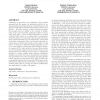Free Online Productivity Tools
i2Speak
i2Symbol
i2OCR
iTex2Img
iWeb2Print
iWeb2Shot
i2Type
iPdf2Split
iPdf2Merge
i2Bopomofo
i2Arabic
i2Style
i2Image
i2PDF
iLatex2Rtf
Sci2ools
ATAL
2007
Springer
2007
Springer
Multiagent learning in adaptive dynamic systems
Classically, an approach to the multiagent policy learning supposed that the agents, via interactions and/or by using preliminary knowledge about the reward functions of all players, would find an interdependent solution called “equilibrium”. Recently, however, certain researchers question the necessity and the validity of the concept of equilibrium as the most important multiagent solution concept. They argue that a “good” learning algorithm is one that is efficient with respect to a certain class of counterparts. Adaptive players is an important class of agents that learn their policies separately from the maintenance of the beliefs about their counterparts’ future actions and make their decisions based on that policy and the current belief. In this paper, we propose an efficient learning algorithm in presence of the adaptive counterparts called Adaptive Dynamics Learner (ADL), which is able to learn an efficient policy over the opponents’ adaptive dynamics rather than ...
Related Content
| Added | 07 Jun 2010 |
| Updated | 07 Jun 2010 |
| Type | Conference |
| Year | 2007 |
| Where | ATAL |
| Authors | Andriy Burkov, Brahim Chaib-draa |
Comments (0)

